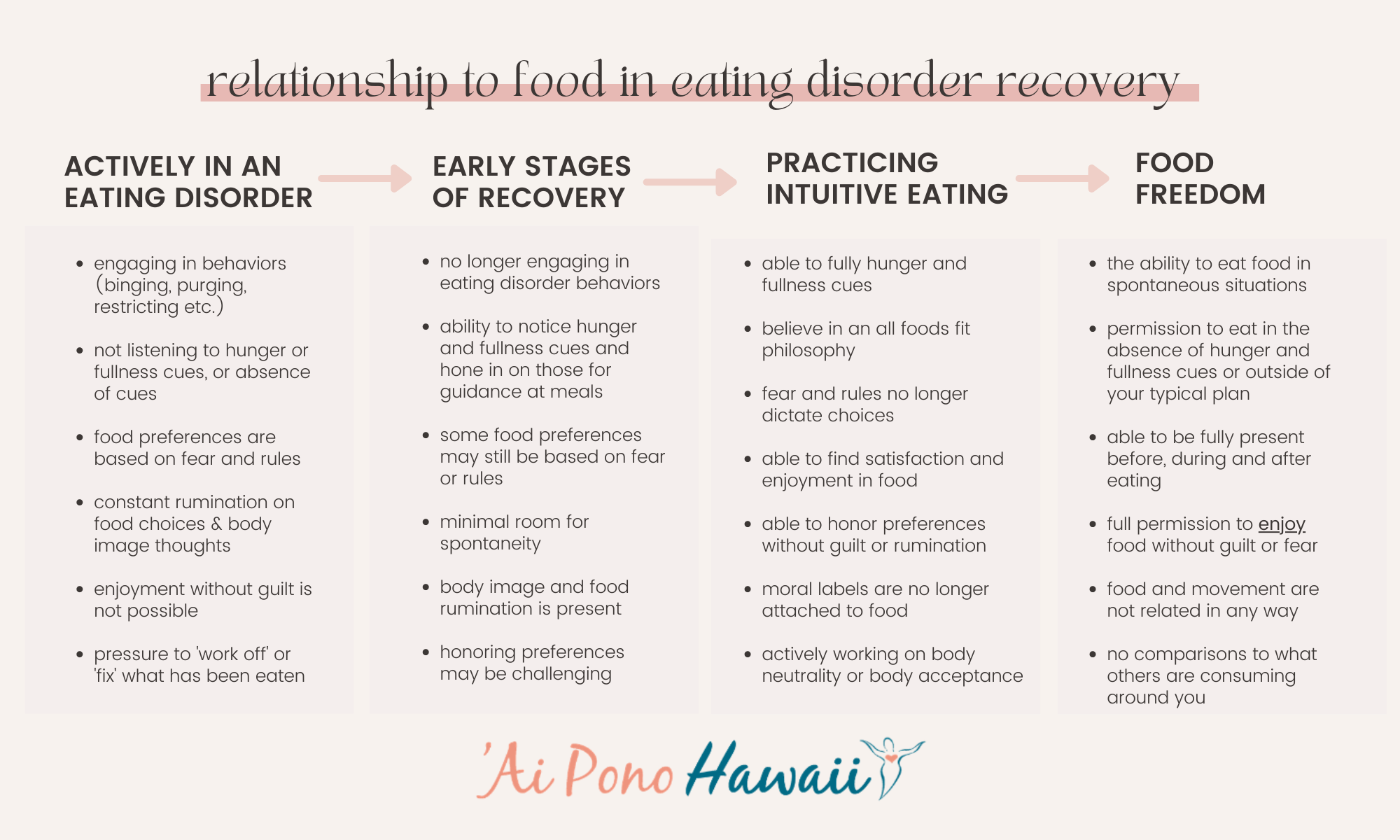What is food freedom? Without a definitive finish line to recovery from an eating disorder or disordered eating, it can be hard to identify when or how you can reach a mentality of food freedom. Read on to learn more about food freedom, how to challenge your eating disorder to reach food freedom and what support may be helpful to help you reach your goals.
In this article, we’ll discuss:
- Where food freedom is on the recovery journey
- How to challenge eating disorder beliefs and thoughts that are holding you back
- Who is able to reach food freedom
- What support is available to support you on this journey
What is food freedom?
To help us define food freedom, let’s discuss the various stages you or your loved one may encounter while in recovery from an eating disorder or disordered eating.
Below we will look at what one’s relationship to food may look like while actively in an eating disorder, in the early stages of recovery, practicing Intuitive Eating and then, ultimately food freedom.
ACTIVELY IN AN EATING DISORDER
When actively in an eating disorder, there is no room for freedom. There are often rules and fears around when, what and how much to eat. Hunger and fullness cues are usually nonexistent and cannot serve as a guide to nourishing one’s body. A constant rumination on food and body image will make it difficult to eat food without guilt.
EARLY STAGES OF RECOVERY
In the early stages of recovery, a specialized meal plan by an eating disorder treatment professional may be implemented to help break disordered habits.
With a decrease or absence of disordered behaviors, hunger and fullness cues will begin to return. These cues become a powerful tool to relearning how to nourish one’s body. During this time, rules and beliefs created by the eating disorder are dismantled and challenged.
Some difficulties encountered during this time may include struggling to let go of safe foods, accepting weight changes, coping with any guilt or judgment and struggling with spontaneity outside of one’s meal plan.
PRACTICING INTUITIVE EATING
In this next phase, letting go of control and beginning to practice Intuitive Eating is the goal. After following and adhering to a meal plan, the transition to Intuitive Eating allows for trusting themselves and their body.
Intuitive Eating means honoring hunger and fullness cues, food preferences and paying attention to how satisfied a meal or snack leaves you feeling.There are no good or bad foods, or sticking to only safe foods. Adopting an All Foods Fit philosophy means fear and rules no longer dictate choices. At this phase, there begins to be room for enjoyment around food.

Food freedom is the ability to be fully present in your life and all that comes with it, including food. It is being able to eat without any rules or restrictions, free of guilt and fear. It is being able to admit you enjoy eating and that it can be pleasurable (maybe even loving a favorite dish or dessert!) It is learning to be comfortable with spontaneity around food, without second guessing how it typically would fit into your meal plan or what number you’re at on the hunger scale. It is being able to eat without ruminating thoughts before, during or afterwards. Food freedom is the ability to let food simply be a part of your life.
How do you reach food freedom?
You must be willing to challenge your eating disorder beliefs to achieve freedom. Here is a checklist that may be helpful in determining where you are at:
- I believe All Foods Fit
- I accept my weight
- I no longer stick to safe foods
- I am honest with myself and my team
- I no longer have rules about when/how much I eat
- I am able to enjoy food without shame
- I believe full recovery is possible
- Food/body thoughts no longer consume me
- I don’t have to earn food
- I don’t compare my food choices to others
- I honor my hunger/fullness
- I feel comfortable eating spontaneously (ie: grabbing ice cream at the beach with friends)
Is everyone able to experience food freedom?
Yes! It may be hard to imagine from where you or your loved one is currently in the recovery journey. But, eating without fear, guilt or judgment is possible. It takes time to dismantle eating disorder rules and let go of the diet mentality our society subscribes to, but it can happen for you.
Remember, food freedom may not be a 24/7 experience at first. Feelings of guilt, judgment or rumination may resurface, and that is OK! With time, food freedom will become your new normal.
What support may be helpful to finding food freedom?
With hard work, perseverance, and the right support you can experience food freedom. Learn more about our holistic approach to eating disorder recovery here.
